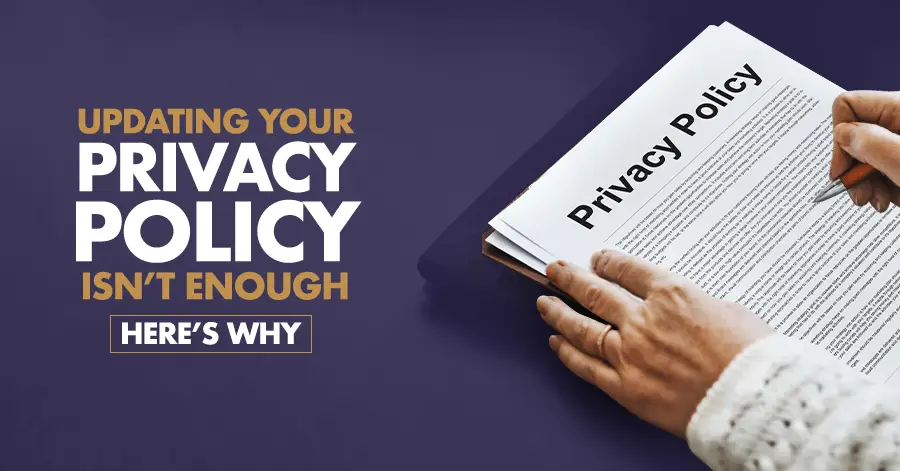Updating Your Privacy Policy Isn’t Enough: Here’s Why


Since its inception in May 2018, the GDPR has been regarded as the gold standard when it comes to data privacy regulations around the world. Many companies initially feared losing business in Europe but began to relax as the stipulations on privacy policies, GDPR definitions, customers’ rights, and other basic measures were revealed.
Making several key changes would keep business owners largely in the clear. But as initial worries died down, some companies relaxed a little too much and made only minimal changes. Many stopped after updating their written privacy policy but failed to implement controls to ensure compliance. Now as privacy regulations are being enforced across the world, is your company meeting all requirements?
Privacy Policy GDPR Requirements
The GDPR requires several key things from a company:
- A clear privacy policy
- Documented legitimate reasons to collect and retain customer data
- Obtaining consent (or permission at minimum) to collect and retain customer data
- Keeping customers informed of what data is collected, how long it is kept, and how it is used
- Allowing customers to exercise their right to be forgotten without jumping through hoops
- Making a “good faith” effort to adhere to legal requirements
You may be tempted to think that a quick privacy policy update will satisfy these requirements. Some companies stop here. However, regardless of how well your privacy policy is written, it’s not enough on its own. Let’s take a look at why.
What Makes a Privacy Policy GDPR-Compliant?
The GDPR places strict guidelines on privacy policies. First of all, the policy must be written in a straightforward manner, with no “legalese”. It cannot go on and on forever with fine print that would take hours to read. Anyone should be able to read your policy quickly and walk away with a detailed understanding of how your company handles their data.
Second, a privacy policy that’s hard to find is a red flag. Remember, the ultimate goal of the GDPR is transparency. A company that makes its privacy policy hard to find not only fails at transparency but also gives the impression that customers won’t like their data collection practices, and they’re hoping no one notices. It’s impossible to overemphasize how much of a bad idea this is.
Third, your privacy policy cannot be written to automatically assume consent. Under the GDPR and several other recent privacy laws, you must obtain explicit consent before collecting and using customer data. Give your customers the choice to grant or withhold this consent.
Fourth, as you rewrite your privacy policy, consider every privacy law you may be subject to. The GDPR is the most famous but is far from the only one. For instance, Canadian customers are covered by CASL, Brazilians by the LGPD, and Californians by the CCPA. Virginia, Nevada, and New York were quick to follow California’s example. Meanwhile, Nebraska and Vermont[UA1] will go into effect in 2025. Include clauses that address each of these laws and explain how you comply with them.
Data Privacy Best Practices
It’s easy to dismiss new laws as merely requiring an update to your privacy policy. Conversely, it’s also easy to feel like keeping up with every new privacy law is impossible. But neglecting to do so can cost your company a pretty penny in fines.
On the opposite extreme, it’s also easy to feel overwhelmed by the long list of new regulations. Either scenario can result in your company failing to fully comply and cost you a pretty penny in fines. [UA2] To avoid either pitfall, it’s time to adopt these best practices for customer data privacy:
- Review how relevant privacy laws define “personal information”. You may be collecting or processing information that you’re not supposed to have.
- Focus on the customers’ best interests and consent rights, not yours. Remember that privacy laws are written to protect customers. Showing that you respect these protections will help earn consumers’ trust.
- Be transparent with your customers. Make it easy for them to find out what data is being collected and how you’re using it.
- Focus on data security. Privacy and security are related concepts, but they aren’t identical.
- Use privacy software that updates with new legal requirements. You need to be able to respond quickly to any new changes.
4Comply Can Help!
With new privacy laws passing consistently, each with their own definitions and requirements, keeping track of everything is a full-time job. Even the smallest change could mean restructuring a significant portion of your system. But you don’t have to handle it all yourself. Instead of rewriting your privacy policy every time a new law passes, try using 4Comply.
4Comply is privacy compliance software that helps you enforce your privacy policies with proper marketing consent management and rights request fulfillment. But 4Comply isn’t just a packaged software solution: it’s also customizable using the Developer API. Your team can easily make 4Comply compatible with your existing forms and programs, all while staying on top of new or updated privacy laws. Data privacy compliance has never been easier!
Ready to streamline your privacy compliance needs? Get in touch with us today to learn how 4Comply can make your job easier.





